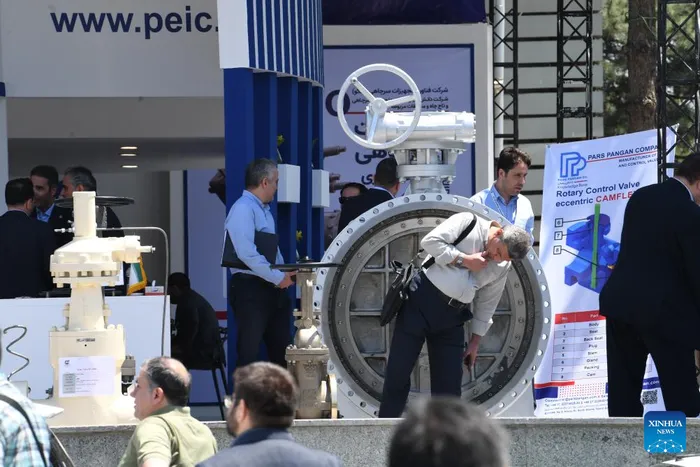
People visit the 29th International Oil, Gas, Refining and Petrochemical Exhibition in Tehran, Iran.
Image: Xinhua
Across the Gulf, national oil companies are rewriting the playbook on how energy infrastructure is financed. Instead of simply operating pipelines and power plants as state-owned assets, they are unlocking billions of dollars in fresh capital by selling minority stakes, all while keeping control over the networks that underpin their economies.
This quiet but powerful shift is reshaping the region’s energy landscape, attracting the world’s largest investors, and creating a new model of monetising critical infrastructure without compromising sovereignty.
Abu Dhabi Leads with Innovative Monetisation
The United Arab Emirates has been at the forefront of this transformation. Abu Dhabi National Oil Company (Adnoc) has spent the past five years steadily converting pipeline assets into financial firepower.
In 2019, Adnoc launched a subsidiary, Adnoc Oil Pipelines, and entered a 23-year lease agreement on 18 of its pipelines. A consortium led by BlackRock and KKR took a 40% stake, injecting $4 billion into Adnoc’s balance sheet.
A year later, the company repeated the model, forming Adnoc Gas Pipelines and selling 49% to a group including Global Infrastructure Partners (GIP), Brookfield, Singapore’s GIC, Ontario Teachers’ Pension Plan, NH Investment & Securities, and Italy’s Snam. That deal raised an additional $10.1 billion.
Adnoc never ceded control in these transactions — it retained majority ownership and operational oversight. And in 2024, local investment powerhouse Lunate, part of an empire overseen by UAE national security adviser Sheikh Tahnoun bin Zayed Al Nahyan, emerged as a central player. Lunate acquired BlackRock and KKR’s oil pipeline stake in April and subsequently took positions in the gas pipelines business. KKR has since followed with its own investment.
The result: Adnoc has raised over $14 billion from pipeline assets without privatising them, while also strengthening its partnerships with the global financial community.
Aramco Expands the Strategy in Saudi Arabia
Saudi Aramco has pushed this model even further, generating larger deals across both oil and gas infrastructure.
In 2021, the company created Aramco Oil Pipelines Co. and sold 49% to a consortium led by EIG Global Energy Partners for $12.4 billion under a 25-year lease agreement. Later that same year, it formed Aramco Gas Pipelines Co., transferring a 49% stake to a group led by BlackRock and Hassana Investment Company in a $15.5 billion transaction.
Aramco continues to explore new monetisation avenues. In 2025, it signed an $11 billion lease-and-leaseback agreement covering infrastructure tied to its Jafurah gas project. The deal was led by Global Infrastructure Partners, now owned by BlackRock.
The company is also examining the sale of up to five gas-fired power plants, which could generate an additional $4 billion, according to reports. All these moves follow the same principle: sell minority stakes, retain operational control, and free up billions for reinvestment.
Oman, Bahrain and Kuwait Follow Suit
The monetisation wave is not confined to the Gulf’s largest producers. Smaller energy players are adopting the same model, signalling a regional transformation in how strategic infrastructure is financed.
Oman’s state energy firm OQ sold 49% of its gas pipeline arm, OQ Gas Networks, through a public offering in 2023. The listing brought in about $750 million, with sovereign wealth giants like Saudi Arabia’s Public Investment Fund, Qatar Investment Authority, and Belgium’s Fluxys among the cornerstone investors. OQ maintained a 51% controlling stake.
Bahrain’s Bapco Energies entered the market last year, selling a minority interest in the Saudi-Bahrain oil pipeline to a BlackRock infrastructure fund — the country’s first-ever infrastructure monetisation. While the value was undisclosed, Bapco, too, kept majority ownership and operational control.
Kuwait is now preparing to join the movement. Kuwait Petroleum Corporation (KPC) is exploring a lease-leaseback deal involving 13 oil pipelines, potentially worth $5–7 billion. Centerview Partners is advising on the transaction, which would mirror the monetisation approaches of Adnoc and Aramco. As with others, KPC is expected to retain operational command.
The interest of global investors is clear. BlackRock, already involved in several deals across the Gulf, is opening a Kuwait office and has appointed Ali AlQadhi to lead operations in the country, a move widely interpreted as positioning for involvement in future infrastructure transactions.
Why This Matters: Capital Without Concession
The core insight from this regional shift is strategic: Gulf national oil companies are showing that it is possible to raise massive sums from existing infrastructure while keeping control firmly in domestic hands.
These transactions appeal to both sides. For investors — from pension funds to sovereign wealth funds — Gulf pipeline and energy assets offer stable, long-term returns in a sector critical to the global economy. For the state-owned companies, the deals unlock liquidity that can be redirected into diversification, downstream projects, renewables, or national economic programmes — all without selling off strategic control.
The presence of heavyweight investors like BlackRock, Brookfield, GIC, and GIP underscores the global appetite for exposure to Gulf energy infrastructure. And the emergence of homegrown players like Lunate signals that the Gulf itself is building financial muscle to play on both sides of these transactions.
A New Financial Era for the Gulf’s Energy Industry
What began as isolated transactions is now a defining feature of Gulf energy strategy. Adnoc, Aramco, OQ, Bapco, and KPC are not just selling stakes; they are pioneering a new financial model for state-owned enterprises; one that balances capital needs with sovereignty, welcomes foreign capital while maintaining national control, and turns hard infrastructure into powerful financial assets.
As oil producers confront an era of energy transition and economic diversification, these deals show how state-owned giants can remain firmly in control while tapping global capital markets. In doing so, the Gulf is rewriting the rules of energy finance; and creating a blueprint that other resource-rich economies may soon follow.
Written By:
*Chloe Maluleke
Associate at BRICS+ Consulting Group
Russian & Middle Eastern Specialist
** MORE ARTICLES ON OUR WEBSITE https://bricscg.com/
** Follow https://x.com/brics_daily on X/Twitter for daily BRICS+ updates
Related Topics: